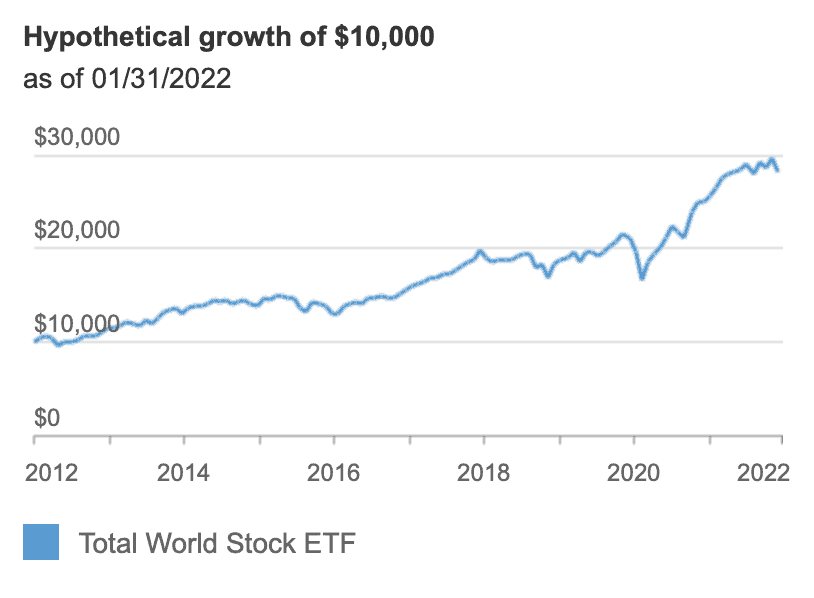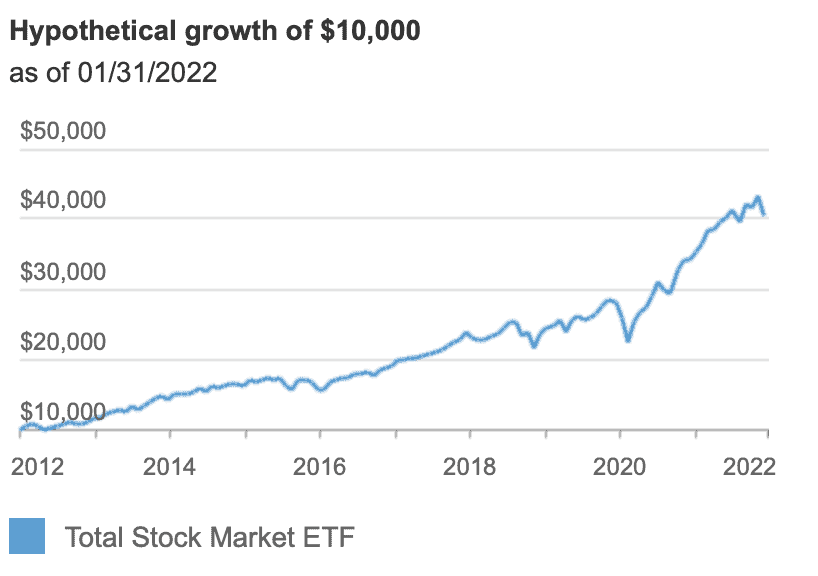Work shapes a third of our lives. If you’re unsure about how to genuinely feel […]
This is a comparison of VTI vs VT. Both are completely different ETFs from Vanguard. Buying into VT or VTI is the simplest way to build wealth overtime. The overlap between these 2 ETFs can be found here.
The advantage of an index fund/ETF over an actively managed fund, is its ability to outperform individual stocks over time. According to Vanguard, in a study of index funds vs active funds, 87% of Vanguard mutual funds and ETFs performed better than their peer-group averages over the past 10 years (For the period ended December 31, 2019)
VT: Vanguard Total World Stock Index Fund ETF (Global stock market)
VTI: Vanguard Total Stock Market Index Fund ETF ( Total U.S. stock market)
VT is the entire global stock market. VTI is just the U.S. stock market.
VTI is designed to provide investors with exposure to the entire U.S. equity market, including small-, mid-, and large-cap growth and value stocks. The fund’s key attributes are its low costs, broad diversification, and the potential for tax efficiency.
To understand the difference between ETF and mutual funds, please read my article here.
VT
- Invests in both foreign and U.S. stocks.
- Seeks to track the performance of the FTSE Global All Cap Index, which covers both well-established and still-developing markets.
- Has high potential for growth, but also high risk; share value may swing up and down more than U.S. or international stock funds.
- Only appropriate for long-term goals.
VTI
- Seeks to track the performance of the CRSP US Total Market Index.
- Large-, mid-, and small-cap equity diversified across growth and value styles.
- Employs a passively managed, index-sampling strategy.
- The fund remains fully invested.
- Low expenses minimize net tracking error.
Why should you consider an ETF
If you seek a low-cost way to gain broad exposure to the U.S. stock market/ Global market, you may consider these index funds. Because VTI and VT (and similar investments) come with built-in diversification, they involve less risk than individual stocks and bonds.
VTI and VTSAX: Historical Performance
| VTI | VOO | VT | SPY | VTSAX | |
| YTD return | -24.87 | -23.9 | -25.56 | -24.25 | -24.89 |
| 1 Year Return | -18 | -15.52 | -20.8 | -15.99 | -18.01 |
| 3 Year Return | 7.58 | 8.12 | 3.87 | 7.56 | 7.59 |
| 5 Year Return | 8.55 | 9.2 | 4.45 | 8.62 | 8.55 |
| 10 Year Return | 11.33 | 11.66 | 7.54 | 11.04 | 11.33 |
| Since Inception | 7.26 | 12.52 | 5.53 | 8.81 | 6.89 |
VT

VTI

VTI and VT: key findings and overlap
| VTI | VT | |
| Description | Vanguard Total Stock Market ETF | Vanguard Total World Stock ETF |
| Asset Class | Domestic Stock - General/ Large Blend | International/Global Stock |
| Expense Ratio | 0.03% | 0.07% |
| Distributions | Quarterly | Quarterly |
| Minimum investment | N/A | N/A |
| Number of stocks | 4136 | 9554 |
| Fund total net assets | $1.3 trillion | $34.1 trillion |
| PE ratio | 21.8x | 13.8x |
| PB ratio | 4.0x | 2.2x |
| ROE | 19.3% | 15.2% |
| Earnings growth rate | 18.1% | 15.8% |
VTI & VT: Fund top holdings
| Allocation | |
| Apple Inc | 3.6% |
| Microsoft Corp. | 2.9% |
| Amazon | 1.7% |
| Tesla | 1.1% |
| Alphabet | 0.9% |
| UnitedHealth Group | 0.8% |
| Johnson & Johnson | 0.8% |
| Berkshire Hathaway | 0.7% |
| Exxon Mobile | 0.6% |
VT: Region Allocation
| Allocation | |
| Emerging Markets | 10.5% |
| Europe | 14.8% |
| Pacific | 10.7% |
| Middle East | 0.2% |
| North America | 63.8% |
Caveat
The key risk for these funds is the volatility that comes with its full exposure to the stock market. Both carry the inherent risk of loss associated with owning assets that follow the stock market.
Differences between VTI vs VT
Liquidity
Both can be bought or sold throughout the trading day.
VTI & VT provide real-time pricing since they are an ETF, so you can see their prices change throughout the day during trading hours.
Unlike a mutual fund, it isn’t priced until the trading day is over. You will not know the price until you’ve placed your trade. As Vanguard explains on their investment page:
Regardless of what time of day you place your order, you’ll get the same price as everyone else who bought and sold that day. That price isn’t calculated until after the trading day is over.
Share Price
Both their share price changes according to the stock market's fluctuations.
Expense Ratio
VTI has a slightly lower expense ratio of 0.03% vs. VT’s 0.08%. It's quite a huge difference in cost, so it can affect the performance of the index funds.
Minimum Fees
- For the price of 1 share
How to buy
You can consider using moomoo/ TD Ameritrade/Tiger Brokers invest in NYSE.
Read the guides here: moomoo, Tiger Brokers
VTI vs VT summary – which one is better?
Both ETFs focus on different markets primarily. It depends if you are keen to invest in U.S, or global as a whole.
With VTI’s slightly lower expense ratio of 0.03% vs. VT’s 0.07%, and higher returns, it seems that VTI is more attractive for now.
Related article
VTI vs VOO: which index fund is a better investment (updated 2020)
Thank you for reading! Please like my Facebook page to get the latest updates. Please click here for Referral deals.






